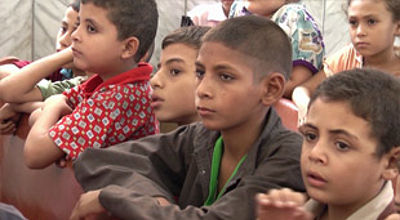Pure Religion: Caring for Egypt’s Social Outcasts
The election of Mohammed Morsi as president gave many Egyptians a sense of optimism and renewed hope. Now, nearly six months later, many are frustrated and impatient as Morsi’s promises of change and economic prosperity have yet to be realized.
Twenty-five percent of all Egyptians live at or below the poverty level, earning less than $2 per day. Many of them are widows. An estimated 1.7 million Egyptian children are orphans.
But several are surviving with the help of American and Egyptian Christians, who are taking the book of James’s admonition to heart: “Religion that God our father accepts as pure and faultless is this: to look after orphans and widows in their distress” (James 1:27).
“The situation of course is getting worse … there’s a lot of insecurities, instability that’s happening in Egypt and basically it’s the weakest and most vulnerable that suffer the most,” said Nermien Riad, founder of Coptic Orphans, a Washington-based group that reaches out to Egyptian widows and their children.
Stopping Perpetual Poverty
“Once a father passes away you have nothing. First step, of course, the children are pulled out of school, you can’t afford to send them to school,” Riad explained. “They become then the child labor. They then become the child brides. They then become those who are abused. They grow to perpetuate this poverty.”
Widows and orphans are treated as social outcasts. Unlike Americans, Egyptians have no unemployment or social security.
Thirty-one-year-old Naima Wahib’s husband, George, died from stomach cancer four years ago. She and her two children have struggled ever since. They live in a small, one-room apartment near the city of Luxor.
Sana, a Coptic Orphans volunteer, regularly visits Wahib and her children.
“If Christian children here in Upper Egypt are to have a brighter future, they’ll need an education,” Sana said as she she helped a young boy learning to read. “Eleven-year-old Antonio here could barely read late last year, but after 15 sessions with a volunteer from Coptic Orphans, he now can read Bible stories.”
“We started out by just sending money, sending money to the children,” Riad said. “Then we realized, ‘Wait a minute. To really help them, get them on their feet, we need to focus on education.'”
Widows and Orphans
A tutor provided by Coptic Orphans also helped 16-year-old Kirillos get better grades in school. Last year, the school ranked him No. 2 in his freshman class. His father, a tailor, died at the age of 38. Today, his sewing machine sits idle in this bedroom.
Kirillos’ mother learned skills of her own but had no money to get started. Coptic Orphans provided her with the seed money to operate a small hair salon in her home.
“Before I had no social life. I was afraid to go out in public. I didn’t have much self-esteem,” she said. “I talk to people now. I’m a totally different person. I thank God this salon is providing food and clothing, everything we need.”
“I’m grateful to the Lord that he provided for us through Coptic Orphans,” she added. “At the end of the day it’s the Lord who is providing for us.”
Fifteen-year-old Aiman was only 3 months old when his father died from intestinal bleeding. Coptic Orphans paid his school fees so he could remain in school.
They also paid for his mother Faisa Said’s heart surgery. She now does some small sewing jobs to help provide for her family. They live in several rooms of one house, but the landlord wants them to leave.
Aiman took Coptic Orphans volunteer Sana on a tour of the house the organization is building for his family.
“Their help has made a big difference. Coptic Orphans are even building us a house and paid for my heart surgery,” Faisa said. “And the children would not have been able to continue with school. They are now doing well in their classes. I am so thankful and grateful to God for the help they’ve given us.”
Tough Days Ahead
Aiman, Kirillos, Antonio and their siblings now have a brighter future because of the help of caring American and Egyptian Christians.
Unfortunately, the rise of the Islamists may cause greater persecution against non-Muslims. That may lead to more widows and orphans in the days ahead.
But Riad said many Christians are ready for the next wave of persecution. She said her organization will be there to help.
“Many of the Christians have told me I am ready to die for Christ, literally. And they will be put in such a situation,” Riad said.
“We want to be more and more ready to prepare and to support and to make the Christians in Egypt stronger and stronger,” she said. “Christ gives us an offer to work beside him and to me, I think it’s the greatest honor.”















































